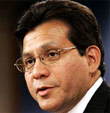| Senior Justice Department officials began drafting memos this month listing specific reasons why they had fired eight U.S. attorneys, intending to cite performance problems such as insubordination, leadership failures and other missteps if needed to convince angry congressional Democrats that the terminations were justified. The memos, organized as charts with entries for each of the federal prosecutors and labeled "for internal DOJ use only," offer new details about disputes over policy, priorities and management styles between the department and several of its U.S. attorneys. The prosecutors' shortcomings also were listed in a talking-points memo, indicating the willingness of the Justice Department to make public what are normally confidential personnel matters in order to counter its critics. Justice Department officials hoped that documenting specific reasons for terminating the prosecutors would satisfy demands for more information after Atty. Gen. Alberto R. Gonzales and his deputy, Paul J. McNulty, described the dismissals as vaguely "performance-related." According to the charts, as well as e-mails and other documents made public Monday and Tuesday, Carol C. Lam in San Diego was dismissed for not prosecuting more firearms and border smuggling cases, and for repeatedly missing deadlines. David C. Iglesias in Albuquerque traveled so much he was considered an "absentee landlord." In San Francisco, where Kevin Ryan was fired, "the office has become the most fractured office in the nation, morale has fallen to the point that it is harming our prosecutorial efforts and [Ryan] has lost the confidence of many of the career prosecutors who are leaving the office." The justification was equally sweeping for Paul Charlton in Phoenix: "Repeated instances of insubordination, actions taken contrary to instructions, and actions that were clearly unauthorized." As for Margaret M. Chiara in Grand Rapids, Mich., the memo advised saying nothing about her dismissal because she had not made public statements in her defense. But the memo also said that "if pushed," the department should say morale in her office was low and that Chiara had lost the support of her staff. The documents show that in a separate chain of e-mails, former White House Counsel Harriet E. Miers mused in November, a month before the firings, about whether President Bush should be briefed about the terminations. |





